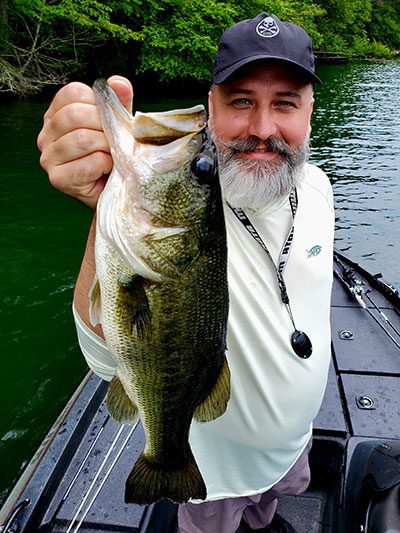If you have not been to the lake in a few weeks and wonder what happened to all the bass, let’s think about this logically. The shad spawn is tapering off and you are starting to see offshore activity like blowups and pods of shade over deeper water. To know where to start you need to know what kind of lake you are on. Are you on a highland or lowland lake, and what is your elevation?
Lowland lakes are self-explanatory. You have low elevation and lots of grass where the sun has penetrated the shallow areas. Your bass will be one or two places. They will go in the thick brush and grass, up shallow, or they will be on the grass edge. This situation happens before the highland lakes because the lower elevations warm before the higher lakes. The higher lakes have a similar situation happen but without the grass edge. If you decide to stay shallow you will be flipping and pitching or fishing the docks. If you go offshore you will be fishing the color line, where the water turns dark.
We are now in the summer patterns. What baits do you select for each plan? Here is more logical thinking. The bass that are offshore are there for the shad, bluegill, and trout. It makes sense they would follow them where they go. In the shallows, bass go for more terrestrials. They will feed more on frogs, rats, worms, and crayfish. You will be flipping, pitching and skipping baits in hard to get to hiding places. Groups of anglers like this to work on the casting skills and accuracy.
Bass that are offshore go deeper where the light cannot penetrate on the color line or they will ambush forage on the grass edge. These bass in the color line are looking up to feed on what is above them. This where you get those blowups. Bass on grass will use the edge like it is a shoreline. You will have points and pockets just like the shore.
During this period, do not forget about night fishing as well. Some bass go nocturnal due to the pressure and activity in the daytime hours. You can usually get into a class of bass that will not eat in the day. These fish are smart and big in most cases for a reason. We have always seen huge bass in the day if you roll up on them or spook them. You can throw the whole book of fishing at them and they will just sit there and look at your bait. Chances are these bass are biting at night. The times to go would be the week leading up to the full moon and a week leading up to the new moon.
Be a logical thinker and do not fish from memory. Bass are always on the move and are motivated by their hunger and experience.
Scott Norton is a Western North Carolina native. Born in Asheville, N.C., he is a long-time hunter, angler and weekend warrior.
